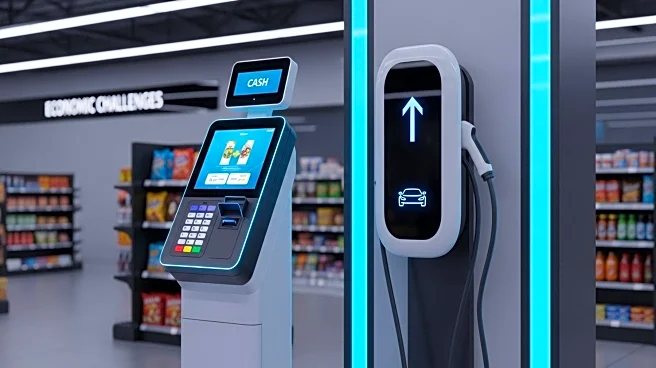What's Happening?
Convenience retailing is experiencing significant shifts due to economic volatility and technological advancements. Art Sebastian, CEO of NexChapter, highlighted these changes at the Outlook Leadership Conference, presenting CSP's new data-driven Outlook Report. The report indicates a decline in fuel trips, driven by the rise of electric vehicles and remote work, which is impacting the convenience store industry. Retailers are facing financial volatility, with fuel margins being a major concern. The report suggests a shift from a fuel-first mindset to offering more value to customers. Additionally, loyalty programs and retail media are becoming crucial for customer engagement, with gamification and tiered rewards being key strategies. Artificial intelligence is also emphasized as a necessary tool for improving operational efficiency and customer personalization.
Why It's Important?
The changes in convenience retailing have broad implications for the industry. As fuel trips decline, retailers must adapt their business models to maintain profitability. The emphasis on loyalty programs and retail media highlights the need for innovative customer engagement strategies. These programs can increase customer retention and drive revenue, especially among millennials who prioritize loyalty. The adoption of artificial intelligence is crucial for retailers to remain competitive, offering benefits such as cost savings and improved inventory management. Midsized retailers face a critical decision point, needing to consolidate, find a niche, or exit the business due to rising costs and competition. The industry's ability to adapt to these changes will determine its future success.
What's Next?
Retailers are expected to focus on enhancing loyalty programs and integrating retail media to boost customer engagement. The adoption of artificial intelligence will likely accelerate, with retailers using it for demand forecasting, inventory management, and personalized marketing. Midsized chains may consider consolidation or niche strategies to remain competitive. The industry will need to address operational challenges, such as labor shortages and resource limitations, to effectively implement these strategies. The next 12 to 24 months will be crucial in defining which retailers thrive and which struggle to adapt to the evolving landscape.
Beyond the Headlines
The shift in convenience retailing reflects broader economic and technological trends. The decline in fuel trips is part of a larger move towards sustainable transportation and remote work, impacting various sectors. The focus on loyalty and retail media indicates a growing importance of data-driven marketing and customer personalization. The adoption of artificial intelligence in retail is part of a wider trend towards automation and efficiency in business operations. These changes may lead to a more competitive and innovative retail environment, with potential benefits for consumers in terms of personalized experiences and value offerings.









